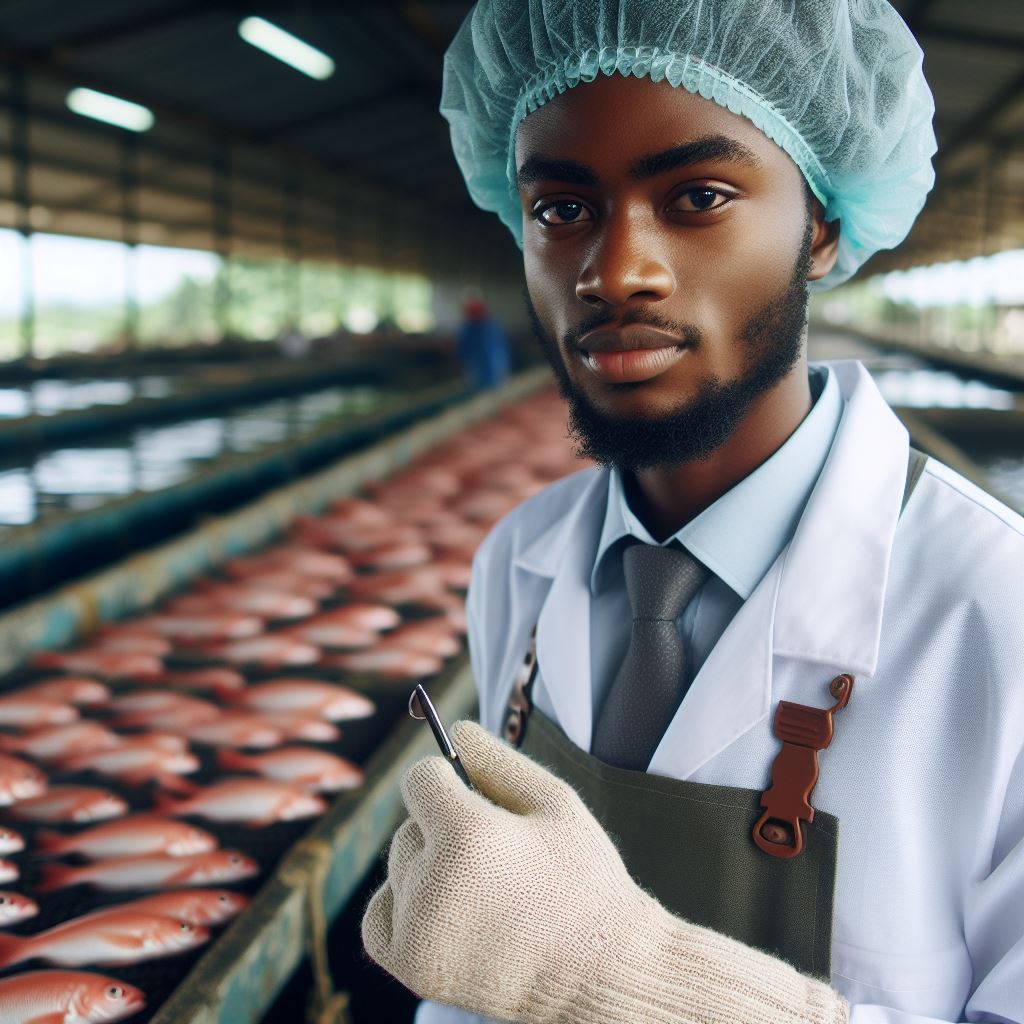Introduction
In this blog post, we will explore Student Life in Nigerian Aquaculture Faculties.
Nigerian Aquaculture Faculties: A Glimpse
Nigerian aquaculture faculties stand as hubs of innovation, merging theoretical knowledge with hands-on experience.
These institutions blend academic rigor with practical skills, shaping the future of aquaculture.
Significance of Student Experiences
Understanding the student journey within these faculties is vital. It unveils the challenges, triumphs, and intricacies that shape their educational voyage.
Their experiences echo the pulse of the aquaculture industry, offering valuable insights.
Thesis Statement
This blog embarks on a compelling journey, delving into the daily lives of students in Nigerian aquaculture faculties.
Through firsthand narratives and observations, it seeks to illuminate the multifaceted experiences, aspirations, and routines shaping their educational odyssey.
In Nigerian aquaculture faculties, students navigate a unique blend of theoretical lectures and practical fieldwork.
They engage in immersive learning, experiencing firsthand the intricacies of aquatic ecosystems.
While attending classes on fish biology, aquaculture management, and environmental sustainability, students often find themselves amidst innovative projects.
These projects foster a spirit of creativity and problem-solving, preparing them for real-world challenges.
Beyond academics, the daily life of a student encompasses a tapestry of extracurricular activities.
From clubs advocating sustainable fishing practices to seminars on emerging technologies, students actively immerse themselves in diverse pursuits.
Moreover, the cultural tapestry within these faculties enriches the student experience.
Diversity amplifies perspectives, fostering an environment conducive to holistic learning and embracing varied viewpoints.
Yet, challenges persist. Balancing academic rigor with practical demands often tests their mettle.
Time management becomes crucial as they juggle assignments, research, and hands-on experiences.
In essence, this blog aims to unravel these layers of experiences.
By providing an intimate glimpse into the lives of students within Nigerian aquaculture faculties, it aims to foster a deeper understanding of their journey, aspirations, and contributions to the aquaculture domain.
Academic Atmosphere in Nigerian Aquaculture Faculties
Curriculum and courses offered
- Nigerian aquaculture faculties provide a comprehensive curriculum focusing on various aspects of aquaculture.
- The core subjects in the aquaculture program include aquaculture production, fish genetics, fish health management, and aquaculture engineering.
- Students are also required to take courses in water quality management, fish feed management, and aquaculture business management.
- The curriculum is designed to provide students with a solid foundation in all areas of aquaculture.
Importance of practical training in aquaculture
- Practical training plays a crucial role in Nigerian aquaculture faculties.
- Students have the opportunity to work in hatcheries, fish farms, and research laboratories.
- Practical training allows students to apply theoretical knowledge and gain hands-on experience.
- It helps them develop practical skills, problem-solving abilities, and a deeper understanding of aquaculture practices.
Classroom dynamics and interaction between students and faculty
- The classroom environment in Nigerian aquaculture faculties is interactive and engaging.
- Professors encourage students to actively participate in discussions and ask questions.
- Faculty members are knowledgeable and supportive, providing guidance and mentorship to students.
- Students have the opportunity to collaborate with faculty on research projects and publications.
Challenges faced by students in academic pursuits
- Students in Nigerian aquaculture faculties face various challenges during their academic journey.
- The workload can be demanding, with numerous assignments, exams, and research projects.
- Access to modern aquaculture facilities and resources is limited in some institutions.
- Financial constraints can also hinder students from fully participating in academic activities.
- However, despite these challenges, students are resilient and determined to excel in their academic pursuits.
In fact, Nigerian aquaculture faculties provide a rich academic atmosphere for students.
The curriculum covers diverse subjects within aquaculture, ensuring a well-rounded education.
Practical training is emphasized, allowing students to apply theoretical concepts in real-world settings.
The classroom dynamics foster interaction and collaboration between students and faculty, creating a supportive learning environment.
Although students face challenges, their determination and resilience contribute to their success in the field of aquaculture.
Read: From Classroom to Fish Farm: Nigerian University Case Studies
Facilities and Resources Available to Students
In Nigerian aquaculture faculties, students have access to a wide range of facilities and resources that enhance their learning experience.
These include research laboratories and equipment, fish farms and hatcheries, as well as libraries and digital resources.
Research laboratories and equipment
Research laboratories and equipment are of utmost importance in aquaculture faculties.
Students are encouraged to gain hands-on experience in research, experimentation, and innovation.
By actively participating in scientific investigations, they develop essential skills and knowledge needed in the aquaculture industry.
Fish farms and hatcheries
Fish farms and hatcheries also play a crucial role in providing practical training to students.
In these facilities, students have the opportunity to learn about fish breeding, feeding, and disease prevention.
They acquire hands-on skills in managing fish populations and maintaining water quality.
This practical experience prepares them to work in the industry and contributes to the overall growth of Nigerian aquaculture.
Library and digital resources
Moreover, fish farms and hatcheries offer students the chance to gain industry experience.
Through internships and work-study programs, students can work alongside professionals and learn about the day-to-day operations of these facilities.
This exposure helps them develop a deeper understanding of the aquaculture industry and increases their employability upon graduation.
Apart from these hands-on facilities, aquaculture faculties also provide students with access to libraries and digital resources.
The library is a valuable resource for acquiring theoretical knowledge and conducting research.
It houses an extensive collection of books, journals, and research papers related to aquaculture and its various sub-disciplines.
Transform Your Career with Expert Guidance
Get personalized mentorship consulting that’s tailored to your unique path. Our expert advice is actionable and exclusive.
Get StartedAdditionally, with the advancements in technology, digital resources such as online journals, e-books, and research databases are readily available to students.
These resources enable students to stay up-to-date with the latest developments in the field and conduct thorough research for their assignments and projects.
In short, the availability of research laboratories, fish farms, hatcheries, libraries, and digital resources greatly enhances the learning experience of students in Nigerian aquaculture faculties.
These facilities provide students with opportunities for hands-on experience, industry exposure, and access to a wealth of knowledge.
By utilizing these resources effectively, students maximize their learning potential and become well-equipped to contribute to the growth and development of the aquaculture industry in Nigeria.
Read: Fisheries in Nigeria: Linking Theory, Practice, and Community

Extracurricular Activities and Student Life
When it comes to extracurricular activities and student life, Nigerian aquaculture faculties offer a vibrant and diverse environment for their students.
Not only do they focus on academic excellence, but they also provide ample opportunities for students to engage in various activities outside the classroom.
Student clubs and organizations related to aquaculture
One notable aspect is the presence of student clubs and organizations related to aquaculture.
Joining these groups brings several benefits.
Firstly, they serve as a platform for like-minded individuals to connect and collaborate.
Students can share knowledge, experiences, and even participate in engaging hands-on activities together.
By joining these clubs, students can broaden their understanding of the aquaculture industry and gain insights from their peers.
Opportunities for networking and internships in the aquaculture industry
Moreover, these clubs offer excellent networking opportunities.
Students can establish connections with professionals already working in the field of aquaculture.
These connections can prove invaluable for future career prospects, as they may lead to internships or job opportunities.
Nigerian aquaculture faculties actively support students in securing internships that align with their interests and career goals.
These internships provide firsthand experience, allowing students to apply their theoretical knowledge in a practical setting.
They also help in developing essential skills and building professional relationships.
Sports and recreational activities available on campus
In addition to academic and professional opportunities, Nigerian aquaculture faculties prioritize the overall well-being of their students.
They encourage a healthy and balanced student life by providing a wide variety of sports and recreational activities.
The campuses boast modern sports facilities catering to different interests.
Whether students prefer football, basketball, swimming, or athletics, there is something for everyone.
Furthermore, recreational activities such as yoga, dance, and fitness classes promote an active lifestyle and contribute to the students’ physical and mental well-being.
Participating in these sports and recreational activities not only offers students a break from their studies but also fosters a sense of camaraderie among the student community.
It promotes teamwork, discipline, and a holistic approach to education.
In general, Nigerian aquaculture faculties recognize the importance of extracurricular activities and student life.
They provide avenues for students to engage with their peers and professionals in the field, bringing together theory and practice.
The diverse range of sports and recreational activities further enhances the overall student experience, promoting a healthy and balanced lifestyle.
Read: Evolving Role of Technology in Nigerian Aquaculture Education
Challenges and Opportunities in Nigerian Aquaculture Faculties
Limited funding and government support
In Nigerian aquaculture faculties, one of the major challenges is the limited funding and lack of government support.
Insufficient financial resources hinder the development and maintenance of proper infrastructure, as well as the capacity for research in these faculties.
The lack of funds and support hampers the progress and growth of aquaculture education in Nigeria.
Job prospects and career development for aquaculture graduates
Aquaculture graduates in Nigeria face difficulties in finding suitable job prospects.
The industry is still emerging, and there is a limited number of established companies and organizations offering employment opportunities in this field.
Additionally, the lack of career development options for aquaculture graduates restricts their professional growth and potential for advancement.
Innovations and research breakthroughs in Nigerian aquaculture faculties
Despite the challenges, Nigerian aquaculture faculties have achieved significant innovations and research breakthroughs.
Through their dedicated efforts, these faculties have made important advancements in aquaculture practices and techniques.
Their research contributes to sustainable aquaculture practices, improved breeding methods, and disease management.
Furthermore, collaborations between aquaculture faculties and industry players enhance innovation and knowledge transfer.
This partnership enables faculties to gain a practical understanding of industry needs, allowing them to tailor their research to address specific challenges.
The collaboration also provides students with valuable exposure to real-world scenarios and practical experience, enhancing their education and preparing them for future careers in aquaculture.
Aquaculture faculties play a crucial role in training and developing skilled professionals who can contribute to the growth of the aquaculture industry in Nigeria.
By imparting knowledge, skills, and hands-on training, these faculties equip students with the necessary tools to excel in the field.
Their efforts help bridge the gap between academic knowledge and industry application, ensuring a competent workforce for the future of Nigerian aquaculture.
In a nutshell, Nigerian aquaculture faculties face challenges in terms of limited funding, government support, job prospects, and career development for graduates.
However, they continue to overcome these challenges through their dedication and commitment to innovation and research.
With adequate funding, government assistance, and industry collaboration, Nigerian aquaculture faculties can further enhance their contributions to the industry’s growth and development.
Read: Innovative Practices in Nigerian Crop Farming
See Related Content: The Future of Plant Breeding and Seed Science in Nigeria
Conclusion
Recap of main pcoints discussed in the blog post
Nigerian aquaculture faculties offer a unique and valuable learning experience for students, combining theoretical knowledge and practical skills.
These faculties provide a comprehensive education in aquaculture, covering various aspects such as fish farming, research, and sustainability.
Importance of aquaculture education in Nigeria
Aquaculture plays a significant role in Nigeria’s economy, providing employment opportunities and contributing to food security.
Thus, acquiring a solid education in this field is crucial for the development of the aquaculture sector and the overall growth of the country.
Encouragement for prospective students to consider aquaculture faculties
If you have a passion for fish farming and sustainability, pursuing a degree in Nigerian aquaculture faculties is a wise choice.
With a strong curriculum, experienced faculty members, and practical training opportunities, these faculties can prepare you for a successful career in the aquaculture industry while making a positive impact on Nigeria’s economy and food production.
Nigerian aquaculture faculties offer a promising educational journey for students interested in this field.
By studying in these faculties, not only will you gain valuable knowledge and skills, but you will also contribute to the growth and development of aquaculture in Nigeria.
So, if you aspire to make a difference in the aquaculture industry, consider joining the esteemed aquaculture faculties in Nigeria and embark on an exciting and rewarding career path.




